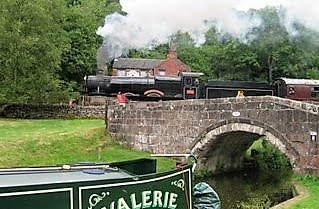finished when a passing wide beam boat stopped for fuel. Look Bonny 3 boats and still plenty of room for boats to pass.
The same view and the bridge has been modernised. A new office block has replaced the old warehouses. You can see the white doors that cargoes would be loaded in/out of boats.
Now if you can`t get a Tesco delivery to the boat then take the boat to Tesco. In the picture ` Like ducks to water ` home to Jacquie and Stein doing exactly what we did when we arrived.

The building next to the lock house is Stockers House built in 1861 for the collector of taxes on coal and wine entering the Metropolitan police district. So this marker is on the border of Hertfordshire and the London borough of Middlesex.
The original boundry was 20 miles out of London and the tax point was Grove Park which is the reason Lady Capels Wharf became a popular place to un-load coal for shipment by horse and cart.
At present we are in London doing the tourist thing for Jaq. The basin next to Paddington station is so convenient for traveling around the city.
Today being the Thatcher funeral London will be a nightmare so we are keeping north of the city.
Stocker’s House was built in 1861 for the City of London Corporation as a residence for its
collector of Coal and Wine Duties on the Grand Union Canal. The bridge is a Grade II Listed
structure, as are the lock and coal duty marker.
The London Coal Duty Marker, erected in 1861,
approximately half a century after the Grand Union Canal
was constructed, is pictured right with Stocker’s House in the
background, where the Collector of Coal Duties resided.
Cast by H. Grissell of Regents Canal Ironworks, it is a castiron
square pier with chamfered corners and pyramid cap,
bearing the City of London Crest. This made it clear that
anyone crossing from Hertfordshire into Middlesex carrying
coal or bottles of wine had to pay a levy to the Lord Mayor,
Aldermen and Common Councillors of the City of London in
accordance with the provisions of the London Coal and Wine
Duties Continuance Act of 1861.








No comments:
Post a Comment